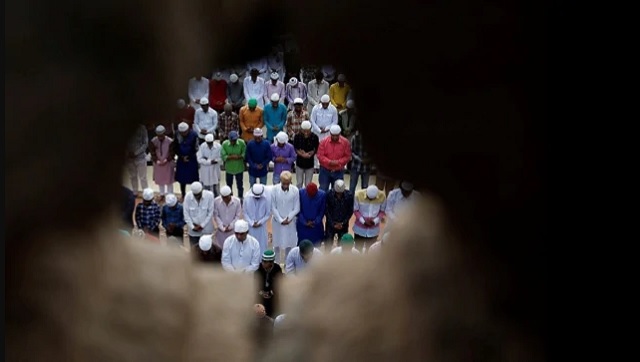After delivering on two of the core pledges — abrogation of Article 370 and settlement of the Ram Mandir issue — the clangour is now growing for the Bharatiya Janata Party’s third promise, the Uniform Civil Code (UCC). The recent remarks by Union Home Minister Amit Shah at the party’s core committee meeting in Bhopal have stirred national politics and reignited the debate on the UCC. The BJP, quite indefatigably and invariably so, has always been a steadfast advocate of the UCC. In fact, the issue was included in the saffron party’s election manifesto in 2019, and it may be a key election theme in 2024 as well. The vitriolic altercation on hijab has further emphasised the need for a Uniform Civil Code in India. Rakesh Sinha, a BJP member in the Rajya Sabha, tabled a private member’s Bill for legislation on the UCC, further fanning the issue. The Delhi High Court is also hearing a similar case filed by BJP leader Ashwini Upadhyaya. And now, in BJP-ruled states, the demand for the UCC is gaining traction. While Uttarakhand and Uttar Pradesh are working on a draft for the UCC, states like Madhya Pradesh have shown support for the common policy. The Uniform Civil Code (under Article 44 of the Constitution) aims to establish laws that apply to all people equally, regardless of religion, gender, caste, or other factors. A common collection of rules covering personal concerns such as marriage, divorce, adoption, inheritance, succession, co-parenting, the division of family property, guardianship, wills, gifts, charity contributions, and other issues is referred to as the Uniform Civil Code. “The State shall endeavour to secure for the citizens a uniform civil code throughout the territory of India,” declares Article 44. However, since the Article happens to fall under the Directive Principles of State Policy, it is presumed to be advisory in nature.
***
Also Read **Uniform Civil Code: BJP rushes to tick the third and final box** **Karnataka hijab controversy: Why Modi government should seriously think about Uniform Civil Code** **Uniform Civil Code: Why states can't legislate on this subject and why Goa example doesn't hold ground** **Amid Udupi hijab controversy, demand for Uniform Civil Code grows stronger** **Why it is right time to discuss and work towards a Uniform Civil Code, shorn of religious rhetoric** **After Uttarakhand and Uttar Pradesh, growing calls in BJP-ruled states for Uniform Civil Code: What does this mean for India?**
***
The advent of the UCC is likely to quash all existing codified personal laws and replace them with a single, universal law. Personal laws are also often contradictory and inconsistent. The UCC will help address this issue. The Lex Loci Report (1837), set up by the first law commission chaired by Lord Macaulay, revealed India’s legal disarray and unpredictability. Almost 200 years later, the issue continues to be discussed with the same trepidation. After Independence, while the Nehruvian dispensation passed the Hindu Code Bill, it dithered on implementing the UCC due to the fear, imagined or otherwise, of offending the Muslim community. The UCC was, instead, added to the list of Directive Principles in the Constitution. Noted feminist Aparna Mahanta said, “The failure of the Indian state to provide a Uniform Civil Code consistent with its democratic, secular, and socialist declarations further illustrates the modern state’s accommodation of the traditional interests of a patriarchal society.” Professor Paula Banerjee remarked that this was done to make sure that it would never be talked about again. Later, Nehru expressed that a UCC was a necessity, but he did not want it to be forced upon any community, especially if they weren’t ready for it. In contrast, the Hindu community was never even consulted, let alone reached concurrence. The areas of Muslim personal law have been left entirely to their religious authorities. This explains why regressive practices such as triple talaq, nikah halala, female genital mutilation (FGM), among others, continue to remain in practice. Daughters receive only half the inheritance that sons are entitled to. The UCC is being debated as if it were a contentious and communal issue, which it is not. It is also being touted that if it is implemented, Hindus will gain at the expense of Muslims, which ostensibly won’t be so! Attempts by several state governments and the Centre to adopt the UCC in India have been branded “unconstitutional and anti-minorities” by the All-India Muslim Personal Law Board (AIMPLB). Instead, the UCC should only be seen from one perspective: Providing “equal” and “inalienable” rights to all beings, including women. India’s courts have been urging successive administrations to implement UCC. They took up this issue in 1985, 1995, 2015, and finally in 2017 when they handed down their verdict in the triple talaq case. To begin with, there was the Shah Bano case in 1985, which ensured Muslim women’s maintenance under the CrPC; the Sarla Mudgal case in 1995, which held that conversion to Islam solely for the purpose of marriage was void; and in 2015, the SC asked the Central government whether it was willing to bring UCC. In 2017, the Shayara Bano case on triple talaq, which declared the practice of instantaneous triple talaq as unconstitutional. We need to realise that in a true democracy, there is no space for discrimination based on one’s gender and religion. Without the UCC, India’s secularism/liberalism is a facade aimed at suppressing the rights of women, transgenders, and the weak. One nation, two different sets of rules based on religion is an oxymoron. The Modi government introduce the UCC which marks the end of such a blatantly discriminatory law in India. The author is an independent journalist and columnist. Views expressed are personal. Read all the Latest News , Trending News , Cricket News , Bollywood News , India News and Entertainment News here. Follow us on Facebook, Twitter and Instagram.


)
)
)
)
)
)
)
)
)



